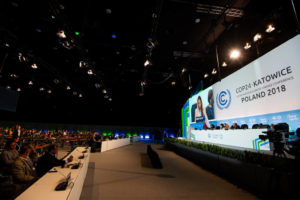Over the weekend, as Aussies were getting ready for Christmas, negotiators wrapped up climate talks in Poland after marathon sessions that put Santa’s shift to shame. After two weeks of tension-filled talks, you might be wondering – do the outcomes bring us cheer over the festive period or did Ebenezer Scrooge put a dampener on climate action?
An ominous start…
It was an ominous start when Ebenezer Scrooge – a collective of fossil fuel powerhouses: the US, Saudi Arabia, Russia and Kuwait – delayed talks as negotiators wrangled over whether to “welcome” or “note” the IPCC’s Special Report on Global Warming of 1.5°C. This is mind boggling, considering the urgent reminder from the scientific community that climate change poses a grave risk to humanity and that IPCC scientific assessments underpin the basis of climate talks such as COP24. See the Climate Council’s report “The good, the bad and the ugly: Limiting temperature rise to 1.5°C” for a reminder of just how urgent the climate challenge is.
Not wanting to seriously acknowledge the IPCC report left countries on the frontline of climate change, such as low-lying Pacific Island Countries, particularly peeved. And the younger generation were also unimpressed. It also shows the glaring gap between what we must do to effectively tackle climate change and what is being done. Even if we implement the pledges made to the Paris Climate Agreement, we’re on track for a 3°C world. And this would have catastrophic consequences for Australia and the rest of the world.
Australia wins Fossil of the Day (again)
Yet again, at these global climate talks, Australia won a ‘‘Fossil of the Day’’ award for greenhouse gas pollution increasing four years in a row. Australia is also considering if it will use carryover credits from the Kyoto Protocol to meet its Paris commitments. This cop out has been described as ‘fake action’ and countries like the UK, Germany and New Zealand have ruled out using carryover credits.
The main task for negotiators and governments at COP24 in Katowice was to hash out the Paris Climate Agreement “rulebook”. As Climate Councillor, Professor Hilary Bambrick mentioned in her blogs from Poland, this is basically an operating manual for when the global deal enters into force in 2020. It outlines regulations on how, for example, countries cut emissions, provide finance to poorer nations and ensure that everyone is doing what they say they are doing.
Did much festive cheer come out of COP24 in Poland?
Almost 200 countries agreed to the 156-page “rulebook”. We now have a single set of rules for all countries to report their pollution levels, with allowances for those that lack the capacity to meet them. And poor countries are assured of getting more certainty about financial support to help them reduce greenhouse gas pollution and cope with inevitable changes such as sea-level rise. But some important decisions have been delayed to next year, such as the mechanisms of an emissions trading scheme and the issue of ratcheting up climate ambition.

So, did Santa deliver?
It’s true, the Christmas stocking has been filled with some goodies, including a fancy new “rulebook”. But we still have a long way to go before we get what we really, really want for Christmas. Effective climate action by phasing out fossil fuels and eliminating greenhouse gas pollution.